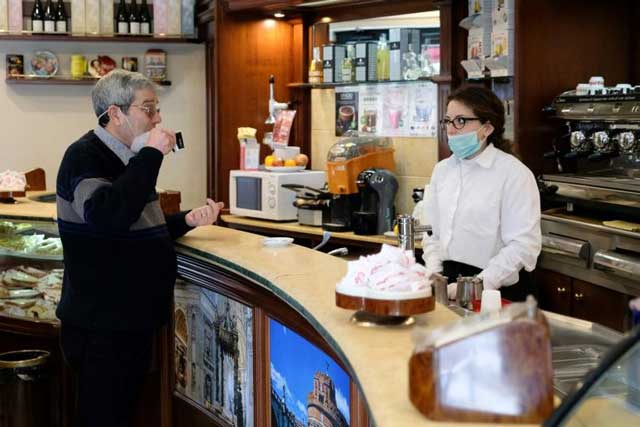
Rome, Italy | AFP | It’s not easy being Italian these days. Especially without coffee.
For Alessandro, a 30-something businessman in suit and mask in central Rome, an espresso at the local bar in the morning is “indispensable”.
But on Thursday, after the government’s latest measures to stem the rise of coronavirus, all bars in Italy, where locals gather to drink coffee, chat and steal a few moments of conviviality before work, were closed.
Alessandro was forced to have coffee at home.
“Let’s just say it’s hard,” said Alessandro, who has drunk his coffee — up to three times a morning — at a bar near his workplace at Piazza Venezia in central Rome for “forever”.
“It hurts me that everything is closed,” he said of the closures of bars, restaurants and other “non-essential” businesses in the usually busy district.
“We usually all joke around together.”
The sudden restriction on a ritual as seemingly banal as morning coffee with others strikes at the core of Italian cultural life — social, familial, and of course, caffeinated.
“Bloody coronavirus, now we’re even denied our coffee? What kind of world are we living in?” lamented Roberto Fichera, a retired man in his 80s, on finding his favourite bar closed nearby the Colosseum.
“Without my pastry and my expresso I can’t start my day.”
Fichera hadn’t heard about the new nationwide restrictions that were announced by Prime Minister Giuseppe Conte on Wednesday in order to halt the spread of the coronavirus that has already killed 827 people in Italy.
The rising death toll and over 12,000 infected people has made Italy, after China, the country most affected by COVID-19, now considered by the World Health Organization to be a pandemic.
Bars, restaurants, and stores — which were previously allowed to operate until 6pm — were to immediately shutter as of Thursday morning.
Grocery stores, pharmacies and various businesses like hardware and mechanic shops remain open, but residents are to stay at home except to travel to work, shop for provisions, or seek medical help.
– Police patrols –
The impact of the new regulations was immediately visible. Outside the Pantheon, the former Roman temple, the cafés lining the cobblestoned piazza were all closed.
The same desolate environment was seen at Piazza Navona, considered by many the most beautiful spot in the city.
Instead of the street musicians and tourists snapping photos, police on foot and in cars circled the square, asking the few passersby for their “self-declarations,” written statements explaining the reason for their leaving their homes.
Those trying to evade the stay-at-home directive risk a fine of up to 200 euros ($225) or three months in prison.
Most appeared to be obeying, however, and grocery stores were nearly empty in Rome’s centre.
Donatella Prampolini, president of national trade union Confcommercio, said home delivery services had spiked 70 percent.
Meanwhile, in the working-class neighbourhood of Testaccio, an auto mechanic, Giacomo, was planning on shutting his shop, even though he was allowed to remain open.
“No one’s coming by,” he said. “If there aren’t any clients, we’ll close.”
For the moment, Giacomo busied himself working on a long-postponed project — fixing his daughter’s car. But after tomorrow?
“Maybe we can play cards.”
 The Independent Uganda: You get the Truth we Pay the Price
The Independent Uganda: You get the Truth we Pay the Price


